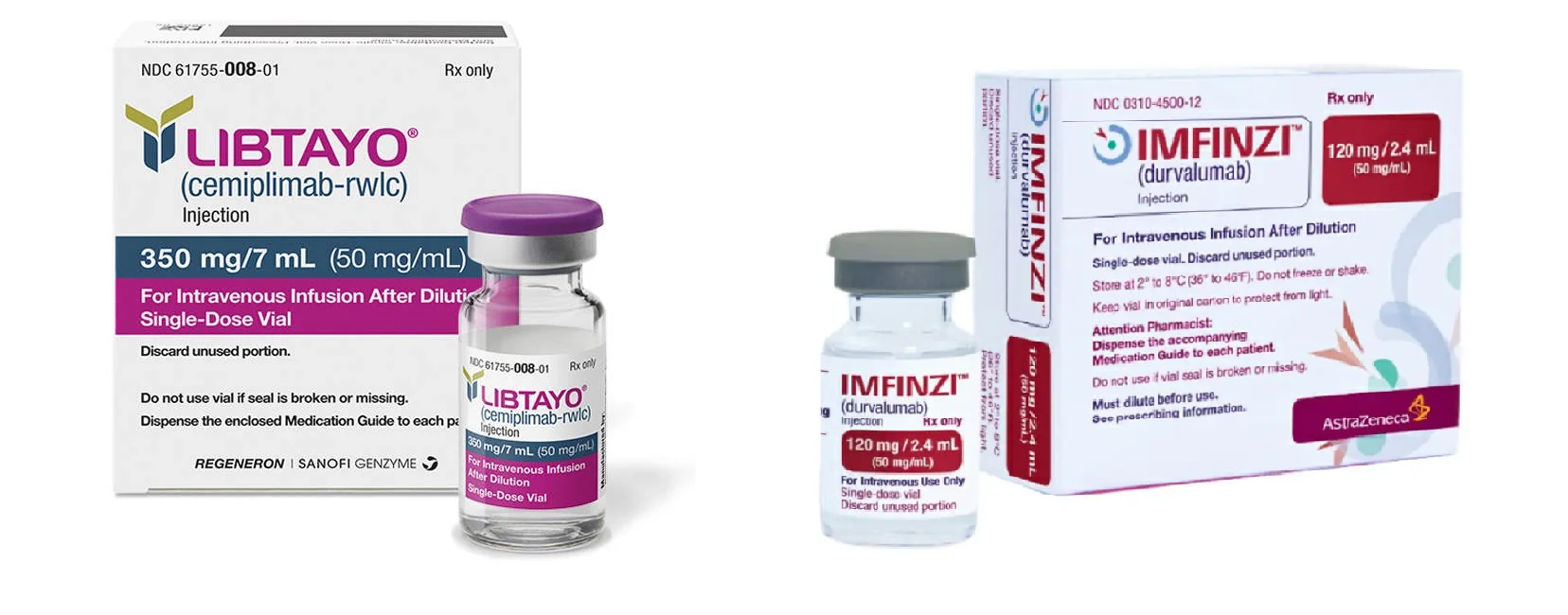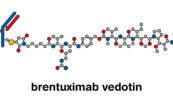Tremelimumab is approved by FDA in combination with durvalumab and platinum-based chemotherapy for metastatic non-small cell lung cancer
November 2022: The combination of tremelimumab (Imjudo, AstraZeneca Pharmaceuticals), durvalumab (Imfinzi, AstraZeneca Pharmaceuticals), and platinum-based chemotherapy was approved by the Food and Drug Administration for adult patients with metastatic non-small cell lung cancer (NSCLC) who lacked sensitising EGFR mutations or anaplastic lymphoma kinase (ALK) genomic tumour aberrations.
POSEIDON (NCT03164616), a randomised (1:1:1), multicenter, active-controlled, open-label study in patients with metastatic NSCLC who had not previously received systemic treatment, assessed the efficacy in these individuals. Tremelimumab, durvalumab, and platinum-based chemotherapy were administered to patients in one of three treatment arms for a total of four cycles, followed by four cycles of durvalumab and maintenance chemotherapy. At week 16, patients received their fifth tremelimumab dosage; (2) durvalumab with platinum-based chemotherapy for four cycles; (3) platinum-based chemotherapy for six cycles; and (4) durvalumab and maintenance chemotherapy.
Treatment was continued until the disease progressed or the side effects became intolerable. Based on a comparison of treatment arms 1 and 3, this approval (675 patients).
Progression-free survival (PFS) as determined by blinded independent central review in accordance with RECIST v1.1 was the primary efficacy outcome measure. include general survival (OS). In comparison to platinum-based chemotherapy, tremelimumab plus durvalumab and platinum-based chemotherapy showed a statistically significant and clinically significant improvement in overall survival (OS) (hazard ratio [HR] of 0.77 [95% CI: 0.65, 0.92], 2-sided p-value = 0.00304); the median OS was 14 months (95% CI: 11.7, 16.1) and 11.7 months (95% CI: 10.5, 13.1) in the treatment arms 1 and 3, respectively The treatment arms’ respective median PFS was 6.2 months (95% CI: 5.0, 6.5) and 4.8 months (95% CI: 4.6, 5.8) (HR: 0.72 [95% CI: 0.60, 0.86], 2-sided p-value = 0.00031).
The overall response rate in treatment arms 1 and 3 was 39% (95% CI: 34, 44) and 24% (95% CI: 20, 29), respectively. In the two treatment arms, the median duration of response was 5.1 months (95% CI: 4.4, 6.0) and 9.5 months (95% CI: 7.2, not reached).
Approximately 20% of participants experienced nausea, fatigue, decreased appetite, musculoskeletal pain, rash, and diarrhoea as side effects. Neutropenia, anaemia, leukopenia, lymphocytopenia, lipase elevation, hyponatremia, and thrombocytopenia were grade 3 or grade 4 laboratory abnormalities ( 10%).
Tremelimumab 75 mg IV every 3 weeks with durvalumab 1500 mg IV and platinum-based chemotherapy for 4 cycles, then durvalumab 1500 mg with maintenance chemotherapy every 4 weeks is the suggested tremelimumab dose for patients weighing 30 kg or greater. At week 16, a fifth tremelimumab dose of 75 mg should be administered.
Using the above dosage schedule, the suggested doses of tremelimumab and durvalumab for patients weighing 30 kg or less are 1 mg/kg and 20 mg/kg, respectively.
View full prescribing information for Imjudo and Imfinzi.
Susan Hau is a distinguished researcher in the field of cancer cell therapy, with a particular focus on T cell-based approaches and cancer vaccines. Her work spans several innovative treatment modalities, including CAR T-cell therapy, TIL (Tumor-Infiltrating Lymphocyte) therapy, and NK (Natural Killer) cell therapy.
Hau's expertise lies in cancer cell biology, where she has made significant contributions to understanding the complex interactions between immune cells and tumors.
Her research aims to enhance the efficacy of immunotherapies by manipulating the tumor microenvironment and exploring novel ways to activate and direct immune responses against cancer cells.
Throughout her career, Hau has collaborated with leading professors and researchers in the field of cancer treatment, both in the United States and China.
These international experiences have broadened her perspective and contributed to her innovative approach to cancer therapy development.
Hau's work is particularly focused on addressing the challenges of treating advanced and metastatic cancers. She has been involved in clinical trials evaluating the safety and efficacy of various immunotherapy approaches, including the promising Gamma Delta T cell therapy.
- Comments Closed
- November 17th, 2022





AstraZeneca Pharmaceuticals, durvalumab, Imjudo, NSCLC, POSEIDON, tremelimumab
CancerFax is the most trusted online platform dedicated to connecting individuals facing advanced-stage cancer with groundbreaking cell therapies.
Send your medical reports and get a free analysis.
🌟 Join us in the fight against cancer! 🌟
Привет,
CancerFax — это самая надежная онлайн-платформа, призванная предоставить людям, столкнувшимся с раком на поздних стадиях, доступ к революционным клеточным методам лечения.
Отправьте свои медицинские заключения и получите бесплатный анализ.
🌟 Присоединяйтесь к нам в борьбе с раком! 🌟